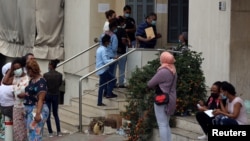Lebanon is home to over 250,000 migrant domestic workers who come from African and Asian countries, most of them women, many of them from Ethiopia.
Amid the intense clashes between Israel and militant group Hezbollah, highlighted by the Israeli airstrikes near Beirut that killed Hezbollah leader Hassan Nasrallah, some Ethiopians are calling for help to leave the country before the violence comes too close.
Aregash Tufa, a nanny, is one of them. She told VOA's Horn of Africa Service that she and her employers were already displaced three times because of the recent Israeli airstrikes.
“There are frightening and terrible noises, the situation is very frightening,” she said. “Most of us, including those who speak other languages, what we are pleading for is if there is a way to return us home, we would like to have someone be a voice for us.”
Aregash appealed to the Ethiopian government to facilitate her exit from Lebanon.
Another Ethiopian national, Medina Hayilee, has been working as a housekeeper in Beirut for the past four years. She expressed desperation and fear for her life.
“All of us are in a horrible situation. Today is the only time we didn’t hear an explosion,” she said, speaking from Beirut on Monday. “If you call me in the afternoon, today, you might not be able to hear my voice.”
Medina said she fears for some Ethiopians who are in prison and in hospitals. If the fighting continues, she said, they would be trapped in the conflict with no ability to flee.
Selamawit Tesfaye, who has been working in Lebanon as caregiver for the last six years, told VOA that she heard that two Ethiopian women working in southeastern Lebanon were killed as a result of Israeli airstrikes, and fellow Ethiopians are working to identify the victims.
“There was no way of communicating because of the attacks in the last days. We will try to identify them starting this Monday,” Selamawit said.
There has been no verification of the alleged deaths and VOA could not independently verify the claims.
Despite the serious safety concerns of the Ethiopian migrant workers, Aregash said the Lebanese people she works with are hopeful that the situation will be calm soon. She said her Lebanese employers told her to not be scared.
VOA’s attempts to reach the Ethiopian Consulate in Beirut and the Ethiopian Foreign Ministry for comment on any assistance being given to Ethiopian workers in Lebanon were unsuccessful.
Some Ethiopians in Beirut told VOA that the Consulate contacted them and told them that Ethiopians who wish to leave the country should register with the Lebanese immigration agency to facilitate their departure. They reported that the consulate urged them to call and register with information of their passport numbers and how many years they have been in Lebanon.
They said they were also asked to give their telephone numbers and say how they can be contacted by the Consulate.
Ethiopia’s Ministry of Foreign Affairs said it is closely monitoring developments in Lebanon to ensure the safety of Ethiopian residents and diplomatic personnel.
The Ministry said officials held a meeting Monday on the safety of Ethiopians in Lebanon. The meeting in Addis Ababa, presided over by State Minister Ambassador Birtukan Ayano, was also attended by leaders and staff from the Ethiopian Consulate in Beirut as well as leaders from relevant offices in the Ministry.
In a statement, the Ministry said discussion focused on “citizen-centered diplomatic activities.”
“Further announcements and follow-ups regarding the situation in Lebanon and the necessary support for Ethiopians residing in the country will be made via appropriate channels of the Foreign Ministry, the Ethiopian Consulate in Lebanon and various Ethiopian Community Associations,” the Ministry said in a statement
This story originated in VOA’s Horn of Africa Service.




